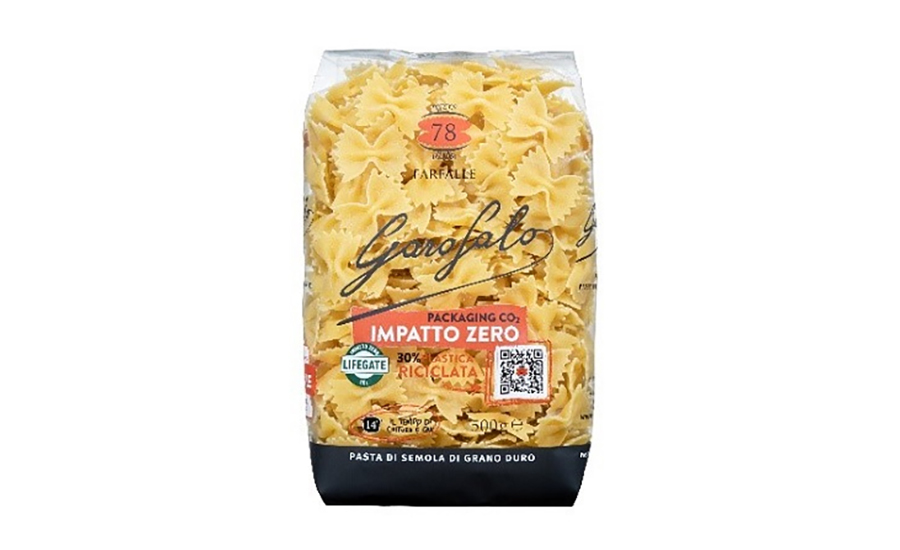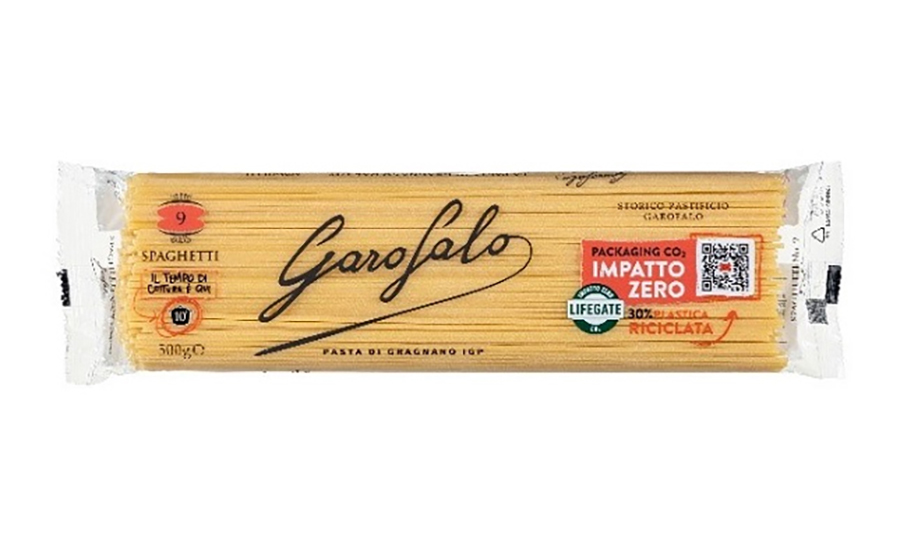Garofalo Pasta Addresses Consumer Concerns with Mono-Material Packaging
Food producers are working with packaging makers to create flexible packaging options that meet existing and proposed EPR regulations.

Image courtesy of Getty Images / cclickclick
Italian-based Pasta Garofalo has introduced biaxially oriented polypropylene (BOPP) film material to its line of select pasta products. This new mono-film material is the product of advanced recycling via some form of pyrolysis—an anaerobic high-heat process that breaks down commingled plastics and produces oil and, eventually, a polymer resin for packaging film material or other uses.
Pasta Garofalo, a prominent Italian pasta manufacturer, adopted this flexible packaging material in March 2023, and 30% of the film material comes from post-consumer recycled material (PCR). Mono-film material is emerging as a crucial sustainability element for food manufacturers in the European Union due to the 30% PCR requirement rules.
For example, a current UK plastic packaging rule requires plastic a tariff of £200 per tonne for any plastic packaging that doesn’t meet 30% PCR content. “So liable packaging would cover a finished component, such as cling (shrink) film, and the tax will reside with the importer, but in the UK, the liability will sit with the converter,” says Richard Freundlich, senior supply chain analyst at Rabobank.
 Garofalo Pasta is launching the first-ever pasta packaging with mono-film material made up of 30% PCR content, produced by GT Polifilm and Polivouga. Image courtesy of Garofalo Pasta
Garofalo Pasta is launching the first-ever pasta packaging with mono-film material made up of 30% PCR content, produced by GT Polifilm and Polivouga. Image courtesy of Garofalo PastaThe motivation for the entire flexible packaging material supply chain is apparent, and similar policies in the U.S. are currently moving through state legislators. Extended producer responsibility (EPR) in the U.S. puts the onus on supply chain partners and companies. EPR adds extra costs to companies when a designated PCR percentage is not met. The proposed EPR rules aren’t in place in the U.S., like in Europe, due to a lack of PCR content.
For Garofalo Pasta, SABIC produces the mono-BOPP feedstock under the product name TRUCIRCLE, which is a PP 525PC grade. GT Polifilm and Polivouga manufacture the packaging film material from the circular polymer, and according to SABIC, this is the first flexible packaging material with 30% PCR for pasta packaging. GT Polifilm adds a cast PP film to the BOPP film to create the mono-material structure and enhance the package's sealing characteristics.
“Of course, this innovative new recycled pasta packaging is just one example of our sustainable initiatives, but it marks an important step forward,” says Dr. Sergio De Gennaro, quality assurance manager at Pasta Garofalo. “It shows how food manufacturers and packaging suppliers work together to bring about much needed change. As a packaging product made with recycled content and fully recyclable, it also has a better consumer appeal.”
SABIC manufactures circular materials using a mass balance accounting scheme according to the International Sustainability & Carbon Certification (ISCC) PLUS program, which follows predefined and transparent rules for tracking the material flow across complex supply chains from the feedstock to the final application.
 The pasta packaging film material comes from a circular polymer. This mono-film material is the product of advanced recycling and pyrolysis.
The pasta packaging film material comes from a circular polymer. This mono-film material is the product of advanced recycling and pyrolysis.In the U.S., the advanced recycling industry is growing. At the Plastics Recycling Conference in Washington, D.C., in March, these big players discussed current developments:
- Brightmark uses pyrolysis to convert plastic oils and is in the process of bringing a facility online in Ashley, Ind.
- Candace Rutherford, feedstock manager at Brightmark, reported that the company in the last year converted 200 million pounds of plastic of all different resin types. Materials included foam, rigid plastics, mixed materials and mixed resins.
- Eastman reported that it is focused on two different technologies: carbon renewal technology—a form of gasification—and polyester renewal technology. The polyester technology employs methanolysis, which is a process using methanol to break down the polymers. Both of these technologies are in use at Eastman’s Kingsport, Tenn., facility. Besides the Tennessee facility, the company is expected to build a new facility in France and a second in the U.S., which has not been announced.
- ExxonMobil’s Natalie Martinez, Advanced Recycling Commercial Manager, noted that Exxtend technology is currently operational at several facilities, including a 40,000 ton/year capacity in Baytown, Texas.
Looking for a reprint of this article?
From high-res PDFs to custom plaques, order your copy today!



![Quad-seal-pouch[52].jpg Quad-seal-pouch[52].jpg](https://www.foodengineeringmag.com/ext/resources/2022/07/10/Quad-seal-pouch%5b52%5d.jpg?height=200&t=1660255689&width=200)



